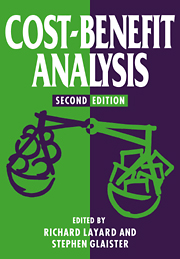Book contents
- Frontmatter
- Contents
- Introduction
- PART I THEORETICAL ISSUES
- PART II HOW TO VALUE THINGS
- 7 Time savings: Research into the value of time
- 8 Safety and the saving of life: The theory of equalizing differences
- 9 Safety and the saving of life: The economics of safety and physical risk
- 10 The environment: The environment and emerging development issues
- 11 Exhaustible resources: Resource depletion, research and development and the social rate of discount
- PART III CASE STUDIES
- Index
10 - The environment: The environment and emerging development issues
Published online by Cambridge University Press: 24 November 2009
- Frontmatter
- Contents
- Introduction
- PART I THEORETICAL ISSUES
- PART II HOW TO VALUE THINGS
- 7 Time savings: Research into the value of time
- 8 Safety and the saving of life: The theory of equalizing differences
- 9 Safety and the saving of life: The economics of safety and physical risk
- 10 The environment: The environment and emerging development issues
- 11 Exhaustible resources: Resource depletion, research and development and the social rate of discount
- PART III CASE STUDIES
- Index
Summary
Environmental resources are of minor importance to poor countries … They play an insignificant role in the process of economic development … Such resources are luxury goods and they loom large in public consciousness only when incomes are high … Environmental resources are only a rich country's preoccupations … They are a mere diversion created by economists not sensitive to the true needs of the poor in poor countries …
These sentences will seem at once strange and recognizable. They will seem strange because today we all like to admit that the ideas they express aren't true. At the same time, they will be recognizable to anyone who has delved into the literature on development economics and looked for environmental issues in it. Even were we to search through the vast body of writings on development planning, not to mention the one on investment criteria, we would be hard put to discover any sign of environmental resources. Official development does not yet acknowledge their existence, in that you won't find them in any recognized survey article, or text or treatise on the subject.
To cite only a few instances, Drèze and Stern (1987) and Stern (1989) are surveys of cost–benefit analysis and development economics, respectively.
- Type
- Chapter
- Information
- Cost-Benefit Analysis , pp. 319 - 348Publisher: Cambridge University PressPrint publication year: 1994
- 8
- Cited by



